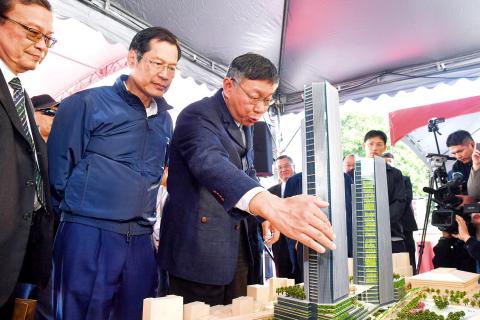A local consortium yesterday signed an agreement with the Taipei City Government to develop a multibillion-dollar complex near Taipei Railway Station, ending more than a decade of uncertainty over the project.
The consortium — comprised of contract computer maker Clevo Co (藍天電腦) and its property affiliate Hongwell Group (宏匯集團) — is to build two high-rise buildings featuring upscale office space, shops and a five-star hotel, Clevo-Hongwell consortium head Kent Hsu (許崑泰) said at a signing ceremony in Taipei.
“It feels like being admitted to college after an outright rejection,” Hsu told reporters.

Photo: CNA
The consortium in December last year lost a bidding race to a foreign group led by Hong Kong-based Nan Hai Development Ltd (南海發展) and Malaysian property developer Malton Berhad by NT$15 billion (US$496.52 million at the current exchange rate).
However, the Ministry of Economic Affairs’ Investment Commission in June disqualified the winners, citing national security concerns.
The city government had tried, unsuccessfully, to find a developer for the project in five rounds of bidding spanning 13 years.
The project would cost NT$60.6 billion, with support from Hsu’s own capital, bank loans and government funds, the tech tycoon-turned developer said.
The mixed-used complex would feature two buildings of 56 and 76 stories intended to renew the area, with easy access to the railway and High-Speed Rail stations, as well as the Taipei Mass Rapid Transit (MRT) system, the airport MRT Line and bus routes, the consortium said.
The towers would have 160,000 ping (528,926m2) of floor space, half of which would be set aside for grade-A office space, while shops would cover 30 percent and hotel rooms would occupy 10,000 ping, Hsu said, adding that there would also be performance halls.
The consortium plans to operate the shopping mall itself and is in talks with international hospitality brands on potential collaboration, he said.
“We will team up with whichever partner can generate the highest return,” Hsu said.
The consortium has promised landlords — the city government and other private owners — monthly rent of NT$2,500 per ping, which means that it needs to charge higher rates to turn a profit after the complex starts operations in 2027, Hsu said.
Local property funds have flowed to office buildings development due to a lack of new products on the horizon, he said, adding that the trend could reverse the landscape and create oversupply in a few years.
The consortium is prepared, as it deems the project a long-term investment that might not generate a profit in the first 10 years of operations, he said.
It would take two years for the venture to clear urban renewal reviews and another four to five years for construction and use license applications, he added.

The US dollar was trading at NT$29.7 at 10am today on the Taipei Foreign Exchange, as the New Taiwan dollar gained NT$1.364 from the previous close last week. The NT dollar continued to rise today, after surging 3.07 percent on Friday. After opening at NT$30.91, the NT dollar gained more than NT$1 in just 15 minutes, briefly passing the NT$30 mark. Before the US Department of the Treasury's semi-annual currency report came out, expectations that the NT dollar would keep rising were already building. The NT dollar on Friday closed at NT$31.064, up by NT$0.953 — a 3.07 percent single-day gain. Today,

‘SHORT TERM’: The local currency would likely remain strong in the near term, driven by anticipated US trade pressure, capital inflows and expectations of a US Fed rate cut The US dollar is expected to fall below NT$30 in the near term, as traders anticipate increased pressure from Washington for Taiwan to allow the New Taiwan dollar to appreciate, Cathay United Bank (國泰世華銀行) chief economist Lin Chi-chao (林啟超) said. Following a sharp drop in the greenback against the NT dollar on Friday, Lin told the Central News Agency that the local currency is likely to remain strong in the short term, driven in part by market psychology surrounding anticipated US policy pressure. On Friday, the US dollar fell NT$0.953, or 3.07 percent, closing at NT$31.064 — its lowest level since Jan.

The New Taiwan dollar and Taiwanese stocks surged on signs that trade tensions between the world’s top two economies might start easing and as US tech earnings boosted the outlook of the nation’s semiconductor exports. The NT dollar strengthened as much as 3.8 percent versus the US dollar to 30.815, the biggest intraday gain since January 2011, closing at NT$31.064. The benchmark TAIEX jumped 2.73 percent to outperform the region’s equity gauges. Outlook for global trade improved after China said it is assessing possible trade talks with the US, providing a boost for the nation’s currency and shares. As the NT dollar

The Financial Supervisory Commission (FSC) yesterday met with some of the nation’s largest insurance companies as a skyrocketing New Taiwan dollar piles pressure on their hundreds of billions of dollars in US bond investments. The commission has asked some life insurance firms, among the biggest Asian holders of US debt, to discuss how the rapidly strengthening NT dollar has impacted their operations, people familiar with the matter said. The meeting took place as the NT dollar jumped as much as 5 percent yesterday, its biggest intraday gain in more than three decades. The local currency surged as exporters rushed to